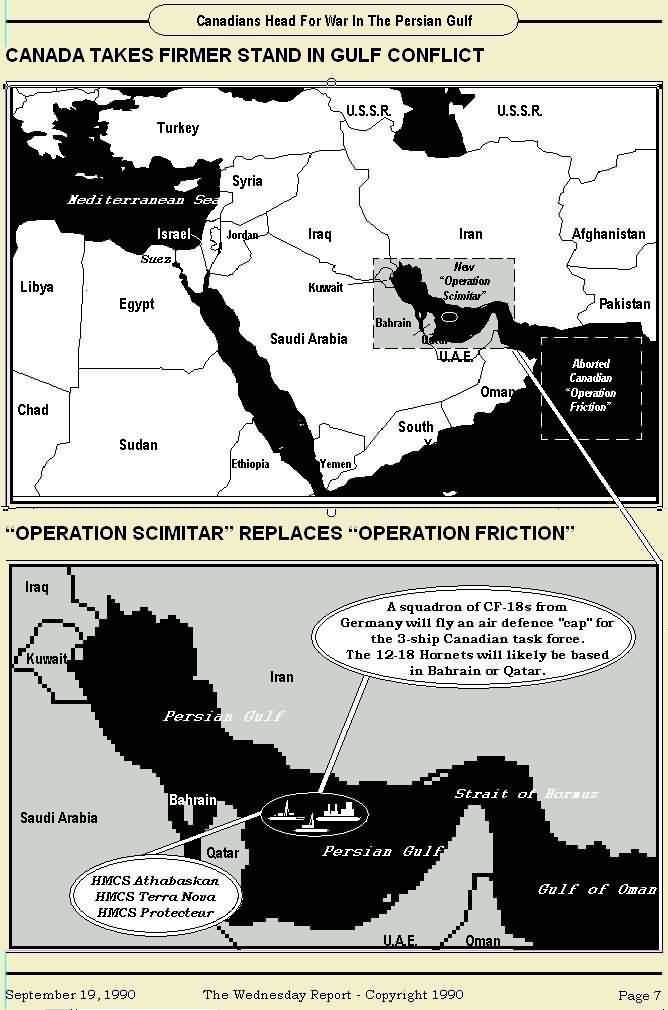![]() Home | Back to TWR Index | Email | The Editor | History | Gulf War
Index
Home | Back to TWR Index | Email | The Editor | History | Gulf War
Index
Canadians Head For War In The Persian Gulf

Volume 4, Number 38 September 19, 1990
Since even before the federal government's decision to send forces to the Middle East, it has become increasingly apparent that firstly, a Gulf war is inevitable, and secondly, Ottawa is sending Canadians into battle.
In this week's report, with files from staff and contributors in Ottawa, Washington, Baghdad, Jerusalem, London, and Paris, we shall endeavour to set out for you the most recent "Gulf" issues and their context.
For you the reader there is much to consider. Industry will recognize the current and potential need for component parts and supplies to support a half-million or more allied military personnel involved in a prolonged conflict. Surge demands for hardware and consumables will only be met by those firms who are prepared to do business under swiftly arranged terms and with mass production of deliverable product. Strategic thinkers must remain open-minded to new developments in a powder-keg environment that is evolving substantively on an hourly basis.
The Gulf crisis four thousand miles away seems remote to many Canadians who are presently consumed in bickering over relatively silly domestic problems. Silly, yes, because in contrast to the horrible starvation, bloodshed, and mayhem engulfing other nations, Canadians living at the highest standards on earth, almost to the point of decadence, are brawling greedily over who has the greatest portion of Canada's resource-rich, million-square-mile geography; whose turn it is to jump onto center stage; and in the case of Indians and reporters, the all consuming issue of who gets to use the cellular telephones.
Bafflegab seems to be the new hallmark of our current-day politicians, perhaps as always, but amplified by "information-age", round-the-clock television news. Liberal defence and foreign affairs critic Lloyd Axworthy says that Brian Mulroney is the real dictator in the Gulf crisis. Figure
Comment:
CANADIANS HEAD FOR WAR
On September 15, Governor General Ray Hnatyshyn signed the federal cabinet's Order in Council ordering "Operation Scimitar" to active service duty in the Persian Gulf. On September 16, destroyer Athabaskan, frigate Terra Nova, and supply-ship Protecteur entered the Red Sea bound for the Arabian Sea and inevitably, war in the Persian Gulf.
Transport Command will airlift troops from third-world countries into Saudi Arabia and a full squadron of CF-18s will provide air cover for the Canadian vessels while in the Persian Gulf.
On the 15th and 22nd of August we presented you with highly detailed reports on the refit of the three-vessel Canadian task force. Sources here in Canada and others we have contacted, especially those with recent, naval combat experience, support in varying degrees our somewhat jingoistic contention that "if Iraqi pilots pick a fight with our sailors, they'll get an awful bloody nose". (See August 22, page 4, "Canada Has Mustered An Impressive Middle East Task Force".)
That of course doesn't guarantee that our vessel under attack wouldn't be sunk in the process. Only a fool in this era of high technology warfare would ignore the prevalent argument that modern warships are little more than ducks-in-the-water targets for well-equipped airborne attackers. Canada as yet has no modern warships. Clearly, DND is extending itself as far as it can go.
